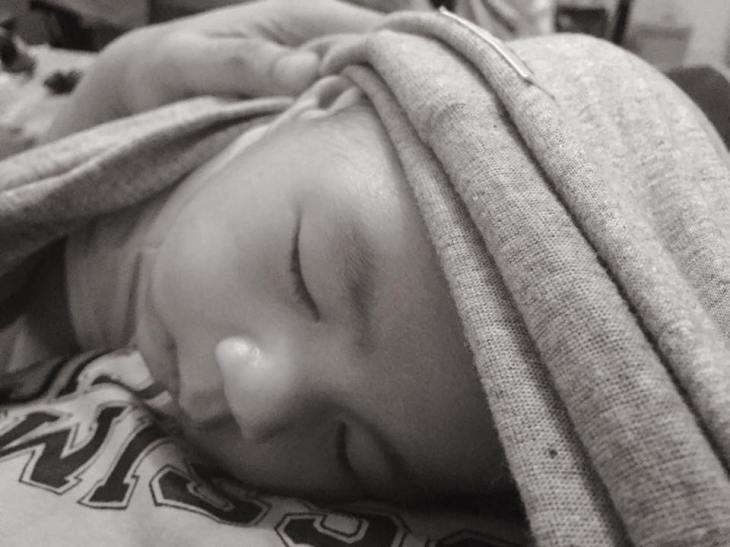
Dear Little One,
Let me tell you how your name was born.
(But first, our gymnast-in-gestation, promise you’ll go easy with the kicks, jabs, and turns? Mommy has been losing sleep because of your spirited acrobatics at very odd hours.)
You’ve probably heard us call you Tiny Tan. We started using that as an endearing monicker (and convenient hashtag) when we didn’t yet know if you were a boy or a girl. But, obviously, we can’t use that as your real name. It’s cute and catchy, but Tiny Tan is surely too generic and, yes, lazy. Not to mention ridiculously shortsighted—we have no intentions of keeping you tiny forever or sentencing you to a life of being bullied. Besides, judging from my genes, you’ll probably be a tall fella. So, Tall Tan then? Nah.
When you were still a few weeks in the tummy, your mommy and I embarked on the wonderful journey of picking a name for you, the unspeakably precious gift that ended our twosome. Not an easy task, by any measure. It’s our first time too. So we took our own sweet time. We tossed around boy names and girl names. Somehow, even before we knew we were carrying a boy—the sonologist placed the odds at 95% certainty, and I saw the “turtle”—we would often end up making more progress with boy names.
After many a wondering, a trying, and—yes—a googling, one glorious day in Parañaque, while I was driving from a meeting and texting your mommy at the same time (not good, I know), we finally pinned down a name for you. Two names, in fact. In conjugal harmony, we decided that you, our firstborn, shall properly, irreversibly—and even birth certificate typos shall not prevail—be known as Xander Amadeus Guerra Tan. (Good luck on your first few days of school, son.)
Or, fondly, Adi.
(I smiled as I typed those three little letters, pretty much the same way I smiled when I saw your tiny thingies, blankies, onesies hanging out to dry the other day after mommy had washed them for the hospital bag. We have your Lola Lils to thank for that nickname which we love. And one of your mommy’s uncles had the same nickname!)
Your first name Xander is derived from my given name, Alexander. My parents, your grannies in Davao, named me after a legendary Macedonian king and warrior, Alexander the Great. I like my name. But I am grateful they decided to do away with “the Great”. Otherwise I would have lived my whole life feeling hopelessly inadequate.
Adi-buddy, do not believe the rumors that we got your first name from the name of a certain teleserye character who may or may not possess the dashing good looks of your father. It is a complete coincidence. Before that fumbling teen actor was Xander, I already was and still am Alexander. Besides, your parents hardly watch TV—not by choice, but by circumstance. (Long story.)
You are Xander because you are the spawn of Alexander. I think I now understand a father’s desire to perpetuate himself in the name of his son. Your mother was amused, and she enjoyed teasing me about it, when I insisted on an Alexander derivative to find its way to your name. It’s a father thing, I suppose. Don’t worry, I was never tempted to make you my junior.
Xander, I can’t explain it now. But I want you to always carry a part of my name, my presence, with you. I hope this will remind you as you go through life that I am proud that God chose me to be your father. And you will bear that beaming pride in your name (and quite possibly in your lack of dancing skills too—sorry). But more than that, I want you, Xander Amadeus, to be the man God has intended for you to be.
Now, Amadeus. This is the good part, son. Friends to whom we’ve shared your second name immediately think of Mozart, the great composer. We don’t mind. (Interestingly, Mozart’s actual second name was Theophilus, which is rendered Amadeus in Latin, a change that he effected as his popularity rose.) Some of our friends assume that we have grand musical dreams for you. The truth is, you weren’t named Amadeus because we want you to be a famous composer, like your Austrian namesake. (But by all means, be one, if that is your gifting and calling! We’ll be the loudest “BRAVO!” in the audience.)
Now back to that day in Parañaque. I was driving and texting (and this you mustn’t do, okay?). For months, your mom and I had been trying out all sorts of names to go with Xander. (Some very silly ones too, from which we will spare you!) But nothing really stuck. That day on the road, I realized I had not really prayed to ask God for your second name! Shame on daddy. And so, on that dusty Parañaque road, while negotiating a series of humps, I prayed.
“Father, would you bring to mind a name for our little one? One that is meaningful and that would remind him of his identity. I know there is no guarantee that life will be easy for him. In fact, I’m sure there’ll be bumps, twists and turns, ups and downs, on his life journey. I would like a name that will tether Him to You. A name that You could perhaps use to remind him of who You are and who he is, especially when he would seem to be losing his way.”
Then the name Amadeus came to mind. I knew it was Mozart’s second name, and I remembered reading about it in Philip Yancey’s book, What’s so Amazing about Grace? I got excited. “Rock me, Amadeus” played in my head. I may have head-banged a little. Xander Amadeus, Xander Amadeus, I repeated to myself. I loved the sound of it. Eager, I reached for my phone.
“Siri, search for meaning of Amadeus.”
“Okay, I found this on the web for meaning of Amadeus…” came the iPhone’s assistant’s emotionless reply.
(You’ll meet Siri one day, Adi. And you can ask her all sorts of goofy questions. I predict Siri and I will be better acquainted in the next few months as your mommy and I learn how to take care of you. “Siri, search for adoption centers?” Kidding.)
Amadeus means, literally, “love of God”. It is—thanks, Siri, for pulling the info from the web—derived from the Latin amare (“to love”) and Deus (“God”).
I was sold! It felt right. It felt… you! More importantly, your mommy was sold, too, after she learned of your name’s meaning. I could have rammed into a tree and not cared. Now the growing joy in my wife’s belly had a name!
From that day on, we would whisper your name to you. I would place both hands on your mommy’s watermelon belly and spread them as wide as I could, amazed at how fast you’ve been growing. With mouth close to mommy’s navel, I’d whisper, “Xander Amadeus? I love you.” Sometimes you would move, and I could feel joy swell within me and my eyes would mist. In the middle of the night, I would hear your mommy talking to you by name, calming you down when you are restless.
We cannot wait to hold you and get to know you, Adi! (We suspect you like spaghetti.) Your name has been born, and it awaits your birth.
My son, you are Xander Amadeus Guerra Tan. And you are loved.
Yours,
Daddy
P.S. Despite the clear and multiple “turtle” sightings on ultrasound, there is a 5% chance that, come delivery day, you’ll turn out to be a lovely girl. I want you to know that that is perfectly fine. We’ll be ready, sweetie. I guess. (“Siri, what’s the female version of…”)






